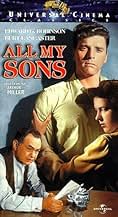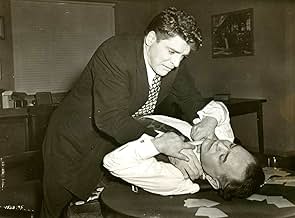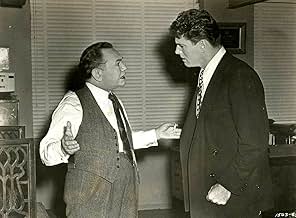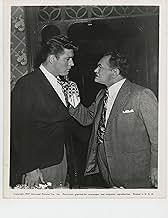IMDb RATING
7.3/10
2.6K
YOUR RATING
During WW2, industrialist Joe Keller commits a crime and frames his business partner Herbert Deever but years later his sin comes back to haunt him when Joe's son plans to marry Deever's dau... Read allDuring WW2, industrialist Joe Keller commits a crime and frames his business partner Herbert Deever but years later his sin comes back to haunt him when Joe's son plans to marry Deever's daughter.During WW2, industrialist Joe Keller commits a crime and frames his business partner Herbert Deever but years later his sin comes back to haunt him when Joe's son plans to marry Deever's daughter.
- Director
- Writers
- Stars
- Awards
- 2 wins & 2 nominations total
Harry Morgan
- Frank Lubey
- (as Henry Morgan)
Margaret Bert
- Townswoman
- (uncredited)
Walter Bonn
- Jorgenson
- (uncredited)
Helen Brown
- Mrs. Hamilton
- (uncredited)
Pat Flaherty
- Bartender
- (uncredited)
Jack Gargan
- Workman
- (uncredited)
Harry Harvey
- Judge
- (uncredited)
Jerry Hausner
- Halliday
- (uncredited)
Herbert Heywood
- McGraw
- (uncredited)
- Director
- Writers
- All cast & crew
- Production, box office & more at IMDbPro
Featured reviews
Since this movie had no particular reputation, I expected a somewhat ho-hum adaptation of Arthur Miller's play. In fact, the movie somewhat improves on the play. It's not afraid to be a little more "superficial" than the play, opting less for profundity than for solid melodrama, and I do mean solid. Robinson is superb, but the real surprise for me was the unshowy, very subtle (for him) performance by Lancaster, never a favorite of mine in his latter-day, hammy period. Here he seems content to be an ensemble player, supporting Robinson and playing a relatively quiet, Gary Cooper sort of role, and therefore he comes off more of a genuine star than usual. When he does finally explode in physical violence, the effect is truly shocking.
I saw this movie today for the umpteenth time and it finally occurred to me... Weren't both men to blame? Wasn't Herbert Deever really just as guilty as Joe Keller? No matter who "says" they are responsible, anyone involved in knowingly shipping faulty parts that could kill people is responsible. Deever shouldn't have sent them out, no matter what he was told. Isn't that what all those Nazis claimed when asked how they could commit so many atrocities? "I was just taking orders." That doesn't wash with me or with most people. We all have a responsibility to follow our own consciences with regard to right and wrong.
They were both guilty....
It's a wonderful story and very well performed and written, but that fact remains to be discussed.
They were both guilty....
It's a wonderful story and very well performed and written, but that fact remains to be discussed.
ALL MY SONS may have been slightly diluted for the screen as compared to the stage play which implicated corruption and wartime profiteering on a higher level than just one or two business men, but it's still powerful stuff and extremely well directed by Irving Reis. Individual scenes have a strength that is impressive, largely due to the excellent central performances of BURT LANCASTER, EDWARD G. ROBINSON and MADY CHRISTIANS. Robinson, in particular, makes the most of a meaty role that has him cocky and confident one moment, then bruised and bitter the next as his past crimes catch up with him--and his conscience.
Seems that during WWII, he and his partner (FRANK CONROY) were pressured to finish making cylinder parts for airplanes on the government's tight schedule and knowingly sent defective parts which caused the death of twenty-one pilots when their planes went down. Robinson has been hiding the truth from himself and his neighbors ever since, concerned only with making a decent living for himself and his family in suburban America.
Conflicts arise when others around him begin to question his role in the crime that sent his partner to jail. The son of the jailed partner, played in rather stiff fashion by HOWARD DUFF, is unforgiving when he realizes Robinson shared the guilt with his father and yet let his father take the blame for the incident. Lancaster, too, and his girlfriend (LOUISA HORTON) who happens to be Duff's sister, also bring the conflicts into the open when they start asking for answers and probing for the truth. Horton is rather colorless in what is meant to be a sympathetic role and spent her remaining years in TV roles.
But it's EDWARD G. ROBINSON who makes the biggest impression as the father, proud of his achievements and obviously in denial until his son, Lancaster, makes him realize why his other son never returned from the war--which leads to a tragic ending.
Summing up: Somber drama never quite overcomes its stage origins but it's still powerful stuff.
Trivia note: The only implausible factor in the casting--the physical impossibility of BURT LANCASTER as Robinson's son, when he bears no physical resemblance whatsoever to Eddie--nor Mady Christians for that matter!
Seems that during WWII, he and his partner (FRANK CONROY) were pressured to finish making cylinder parts for airplanes on the government's tight schedule and knowingly sent defective parts which caused the death of twenty-one pilots when their planes went down. Robinson has been hiding the truth from himself and his neighbors ever since, concerned only with making a decent living for himself and his family in suburban America.
Conflicts arise when others around him begin to question his role in the crime that sent his partner to jail. The son of the jailed partner, played in rather stiff fashion by HOWARD DUFF, is unforgiving when he realizes Robinson shared the guilt with his father and yet let his father take the blame for the incident. Lancaster, too, and his girlfriend (LOUISA HORTON) who happens to be Duff's sister, also bring the conflicts into the open when they start asking for answers and probing for the truth. Horton is rather colorless in what is meant to be a sympathetic role and spent her remaining years in TV roles.
But it's EDWARD G. ROBINSON who makes the biggest impression as the father, proud of his achievements and obviously in denial until his son, Lancaster, makes him realize why his other son never returned from the war--which leads to a tragic ending.
Summing up: Somber drama never quite overcomes its stage origins but it's still powerful stuff.
Trivia note: The only implausible factor in the casting--the physical impossibility of BURT LANCASTER as Robinson's son, when he bears no physical resemblance whatsoever to Eddie--nor Mady Christians for that matter!
Although Edward G. Robinson was most famous for playing gangsters, he was a very versatile actor, playing comedies, dramas, and even period pieces. He even took on the very heavy lead in the Arthur Miller play All My Sons. Upsetting, intimate, and one you'll probably watch only once, All My Sons is worth it for the acting. Eddie G is fantastic! His long-suffering wife Mady Christians (really only remembered today as Shirley Temple's aunt in Heidi) won a Rag award for her performance. Though filmed in 1948, everyone is very realistic and subtle in their deliveries. This may be a play adaptation, but it's as much of an eavesdropped slice of life as it can possibly be.
Even starting with the opening credits, it feels like you're observing a family, not watching a movie. From the dawn of Tinseltown, credits preceded the film with music (or silence) and black and white titles. All My Sons was either the first or one of the first films to show footage behind the text instead. Immediately, you're immersed. When Burt Lancaster shares scenes with his girlfriend, Louisa Horton, you hear them whispering while in dim lighting. This is an entirely different type of drama. There aren't spotlights, strategically turned heads during important lines, and shouting to the back row.
If you like upsetting dramas, this might become a favorite of yours - especially if you're an Arthur Miller fan. Director Irving Reis got the best performances from his actors and brought what could have been a melodrama into a family's living room. It's a very good film, but it might be too heavy for the average viewer.
Even starting with the opening credits, it feels like you're observing a family, not watching a movie. From the dawn of Tinseltown, credits preceded the film with music (or silence) and black and white titles. All My Sons was either the first or one of the first films to show footage behind the text instead. Immediately, you're immersed. When Burt Lancaster shares scenes with his girlfriend, Louisa Horton, you hear them whispering while in dim lighting. This is an entirely different type of drama. There aren't spotlights, strategically turned heads during important lines, and shouting to the back row.
If you like upsetting dramas, this might become a favorite of yours - especially if you're an Arthur Miller fan. Director Irving Reis got the best performances from his actors and brought what could have been a melodrama into a family's living room. It's a very good film, but it might be too heavy for the average viewer.
Playwright Arthur Miller had a great deal at stake when his play 'All my Sons' opened on Broadway in 1947. He later admitted that had the play failed he would have been obliged to find another line of work. Directed by Elia Kazan and featuring a top notch cast it ran for almost two years. The rest, as they say, is history.
It did not take long of course for Hollywood to pounce and to make a version that Miller himself came to despise. This play is not the last in which Miller would show the darker side of the American Dream. Adaptor Chester Erskine has however, carefully removed any of Miller's leftist sentiments and the crime committed by Joe Keller in selling defective cylinders to the US Airforce, which results in the death of 21 pilots, is blamed on Keller's own greed rather than the Capitalist system that created him and so many like him.
To my knowledge there is nothing in the previous films of Irving Reis that would suggest his being capable of doing justice to this material and his direction lacks fluidity. He is aided by the 'noirish' touches of cinematographer Russell Metty and an understated score by Leith Stevens. In keeping with the inevitable compromise of film, some characters, notably Dr. and Mrs. Bayliss, have been diminished. Keller's business partner Deever who has taken the rap for the crime and is only spoken of in the play, is here given a speaking role which is filmically very effective. Deever's daughter Ann is played by Louisa Horton who is not a typical Hollywood glamour puss by any means but whose directness and sincerity make her excellent casting. This was to be her first and only film role of note. Burt Lancaster plays Keller's son Chris. Although keen to improve as an actor, Lancaster's charisma works against him here and he does not really convince as an average Joe. As Deever's son, Howard Gruff is as Duff as ever and strictly one dimensional. The strength of the film lies in the performances of Edward G. Robinson and Mady Christians as Joe and Kate. Robinson is superlative as a man whose outward bonhomie and confidence conceal a terrible sense of guilt. His assertions that he did it 'for the family' have a hollow ring. Kate is living in a fantasy world, clinging to the belief that their son Larry, reported lost in action, will return. The devastating scene in which she reads the letter confirming his death is beautifully played.
Ironically Miller, Robinson and Christians were all summoned by the HUAC for alleged Communist leanings. Miller emerged unscathed, Robinson's 'A' listing suffered throughout the 1950's until Cecil B. de Mille came to his rescue but Christians was not so fortunate. Her outspokenness not only shattered her career but ended her life.
This piece is decidedly not filmed theatre. It is cinema but alas, not great cinema.
It did not take long of course for Hollywood to pounce and to make a version that Miller himself came to despise. This play is not the last in which Miller would show the darker side of the American Dream. Adaptor Chester Erskine has however, carefully removed any of Miller's leftist sentiments and the crime committed by Joe Keller in selling defective cylinders to the US Airforce, which results in the death of 21 pilots, is blamed on Keller's own greed rather than the Capitalist system that created him and so many like him.
To my knowledge there is nothing in the previous films of Irving Reis that would suggest his being capable of doing justice to this material and his direction lacks fluidity. He is aided by the 'noirish' touches of cinematographer Russell Metty and an understated score by Leith Stevens. In keeping with the inevitable compromise of film, some characters, notably Dr. and Mrs. Bayliss, have been diminished. Keller's business partner Deever who has taken the rap for the crime and is only spoken of in the play, is here given a speaking role which is filmically very effective. Deever's daughter Ann is played by Louisa Horton who is not a typical Hollywood glamour puss by any means but whose directness and sincerity make her excellent casting. This was to be her first and only film role of note. Burt Lancaster plays Keller's son Chris. Although keen to improve as an actor, Lancaster's charisma works against him here and he does not really convince as an average Joe. As Deever's son, Howard Gruff is as Duff as ever and strictly one dimensional. The strength of the film lies in the performances of Edward G. Robinson and Mady Christians as Joe and Kate. Robinson is superlative as a man whose outward bonhomie and confidence conceal a terrible sense of guilt. His assertions that he did it 'for the family' have a hollow ring. Kate is living in a fantasy world, clinging to the belief that their son Larry, reported lost in action, will return. The devastating scene in which she reads the letter confirming his death is beautifully played.
Ironically Miller, Robinson and Christians were all summoned by the HUAC for alleged Communist leanings. Miller emerged unscathed, Robinson's 'A' listing suffered throughout the 1950's until Cecil B. de Mille came to his rescue but Christians was not so fortunate. Her outspokenness not only shattered her career but ended her life.
This piece is decidedly not filmed theatre. It is cinema but alas, not great cinema.
Did you know
- TriviaThe original Broadway production of "All My Sons" opened at the Coronet Theater in New York on January 29, 1947. It ran for 328 performances, and won the 1947 Best Play Tony Award for author Arthur Miller. His original script was used as the basis for this movie's screenplay.
- GoofsWhen Joe comes out of the house upon Annie's arrival, he comes down the front steps and walks into the yard with his arms raised. In the next instant, he's back at the steps and his arms are down.
- Quotes
Jim Bayliss: Put her to bed, Joe. Both of you go to bed. Staying up won't help; sleep will. Sleep's a wonderful thing, the best thing about living.
- ConnectionsFeatured in Film Preview: Episode #1.1 (1966)
- How long is All My Sons?Powered by Alexa
Details
- Release date
- Country of origin
- Official sites
- Language
- Also known as
- All My Sons
- Filming locations
- Santa Rosa, California, USA(the Grace home on McDonald Avenue)
- Production company
- See more company credits at IMDbPro
- Runtime
- 1h 34m(94 min)
- Color
- Aspect ratio
- 1.37 : 1
Contribute to this page
Suggest an edit or add missing content




































